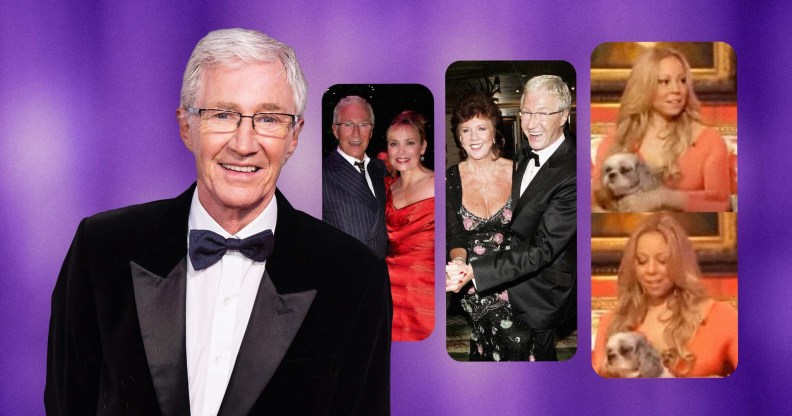How Paul O’Grady ruled pop culture, from Lady Gaga and Mariah Carey to Coronation Street

For nearly 45 years, Paul O’Grady dominated all corners of popular culture. (Getty/The Paul O’Grady Show)
There is very little that Lady Gaga, Coronation Street‘s Blanche Hunt and the team at Battersea Dogs and Cats Home have in common – besides, perhaps, their love of TV legend Paul O’Grady.
As the LGBTQ+ community and world of entertainment come together to mourn the loss of the renowned comedian, who died on Tuesday (28 March), aged 67, the extent to which O’Grady dominated popular culture for the past four decades has become crystal clear.
Beginning his career in the late 1970s, O’Grady took London’s underground queer scene by storm as his foul-mouthed, campy drag persona Lily Savage. It was an act of rebellion in itself, considering hateful rhetoric about the HIV/Aids epidemic and the gay community was rising rapidly.
For the community growing up queer at the time, O’Grady needn’t have done more than take to the stage at London’s Royal Vauxhall Tavern every week to still be considered a gay hero. Not content with only having ruled the capital’s drag scene though, O’Grady pushed for mainstream success – and found it.
The pathway from drag club floor to day-time talk show is typically an unfrequented one, but Paul O’Grady did it. From presenting Channel 4’s morning show The Big Breakfast in 1995, to his time on BBC quiz show and Drag Race‘s Snatch Game inspiration Blankety Blank, O’Grady managed to blur the line between queer culture and mainstream entertainment.
Wig stacked and leopard print furs ever-present, Savage’s irrepressible appeal bagged O’Grady friendships with some of the biggest stars in showbiz, including long-term pals Elton John and Cilla Black. The charm was appreciated across the Atlantic, too – according to O’Grady’s biographer Neil Simpson, his early TV days allowed him to get close to the likes of US pop star and actor Cher.

Game shows, morning television and starry acquaintances conquered, O’Grady moved into the British soaps sphere. Not too literally – although Savage actually got one of her first TV breaks by appearing in an episode of Brookside. O’Grady became a pervasive presence among the likes of Britain’s top soap stars, including EastEnders‘ royalty Barbara Windsor and June Brown.

In 2004 and 2005, he presented the Great British Soap Awards, while in later years he hosted quiz show Coronation Street: The Big 50 to mark the ITV flagship programme’s golden anniversary. He popped up on the BBC too, in hit shows such as Doctor Who and Holby City, and played Marlene Dietrich in the anarchic political comedy The New Statesman. He was also seen on the big screen in In The Name of The Father.
This cut-through from London drag icon to soap-dwelling TV star was captured best by Coronation Street’s beloved battleaxe Blanche Hunt, who famously told long-suffering Deirdre Barlow: “I have no problem with the gays. You know I’d walk on hot coals for Paul O’Grady.”
The clip frequently goes viral on gay Twitter, capturing the community’s love for cultural crossovers.
For so many queer people growing up in the mid-Noughties though, O’Grady’s tea-time The Paul O’Grady Show was possibly his most memorable cultural legacy. As writer Harrison Brocklehurst explained, his unapologetic queerness on after-school TV was a comforting respite from the homophobia that still plagued schools at the time, even if many didn’t appreciate his impact immediately.
It was on O’Grady’s chat-show sofa that so many of the world’s biggest stars sat, bringing the glamour of Hollywood into living rooms across the UK, while dinner was in the oven. Many of the guests were, themselves, gay legends, once again bridging the gap between LGBTQ+ culture and the heteronormative environments many young queer people found themselves in.
One favourite moment was when Mariah Carey – as much of a dog lover as O’Grady was– became best friends with the comedian’s pooch Buster.
Personally, I have distinct memories of Ke$ha on the show, singing “Your Love Is My Drug” while asking the people of the UK to “make out” at 5pm. Then there was Lady Gaga’s Born This Way special, an hour-long performance and interview with O’Grady following the album’s release.
After Sex and the City’s Kim Cattrall appeared on the show, she remained friends with O’Grady, sharing her own tribute after his death.
O’Grady drew stars from all corners of the celebrity sphere together, slathered their conversations with camp, and presented it to the masses at 5pm. Later, he’d take over prime-time TV with For The Love of Dogs, his ITV documentary. Whatever he did, he was always everyone’s favourite.
In a bittersweet, full-circle moment, O’Grady’s final project before his death was back in drag, on the stage as Miss Hannigan in Annie.
He entered the drag scene in an era where LGBTQ+ people were abhorred, and he leaves it a time where ugly narratives are rearing their heads again. But, for the queer people who have come in the decades between, Paul O’Grady changed the game. In being visibly queer, he injected drag into the cultural lexicon, and taught a generation of LGBTQ+ people that it’s OK to be seen.
There was not an element of his personality that we did not see on screen, and barely an element of popular culture that he left untouched. We’re so much better for it.
How did this story make you feel?

